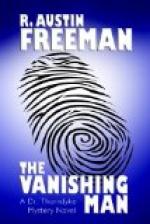“The other events of that day, including the dropping of the scarab, I need not describe, as they are known to you. But I may fitly make a few remarks on the unfortunate tactical error into which I fell in respect of the bones. That error arose, as you have doubtless perceived, from the lawyer’s incurable habit of underestimating the scientific expert. I had no idea that mere bones were capable of furnishing so much information to a man of science.
“The way in which the affair came about was this: The damaged mummy of Sebek-hotep, perishing gradually by exposure to the air, was not only an eyesore to me: it was a definite danger. It was the only remaining link between me and the disappearance. I resolved to be rid of it and cast about for some means of destroying it. And then, in an evil moment, the idea of utilising it occurred to me.
“There was an undoubted danger that the Court might refuse to presume death after so short an interval; and if the permission should be postponed, the will might never be administered during my lifetime. Hence, if these bones of Sebek-hotep could be made to simulate the remains of the deceased testator, a definite good would be achieved. But I knew that the entire skeleton could never be mistaken for his. The deceased had broken his knee-caps and damaged his ankle, injuries which I assumed would leave some permanent trace. But if a judicious selection of the bones were deposited in a suitable place, together with some object clearly identifiable as appertaining to the deceased, it seemed to me that the difficulty would be met. I need not trouble you with details. The course which I adopted is known to you with the attendant circumstances, even to the accidental detachment of the right hand—which broke off as I was packing the arm in my handbag. Erroneous as that course was, it would have been successful but for the unforeseen contingency of your being retained in the case.
“Thus, for nearly two years, I remained in complete security. From time to time I dropped in at the museum to see if the deceased was keeping in good condition; and on those occasions I used to reflect with satisfaction on the gratifying circumstance—accidental though it was—that his wishes, as expressed (very imperfectly) in clause two, had been fully complied with, and that without prejudice to my interests.
“The awakening came on that evening when I saw you at the Temple gate talking with Doctor Berkeley. I suspected immediately that something had gone amiss and that it was too late to take any useful action. Since then, I have waited here in hourly expectation of this visit. And now the time has come. You have made the winning move and it remains only for me to pay my debts like an honest gambler.”
He paused and quietly lit his cigarette. Inspector Badger yawned and put away his note-book.
“Have you done, Mr. Jellicoe?” the inspector asked. “I want to carry out my contract to the letter, you know, though it’s getting devilish late.”




